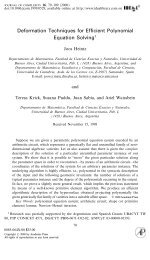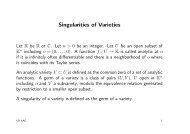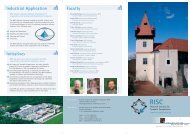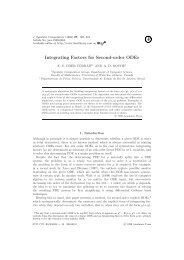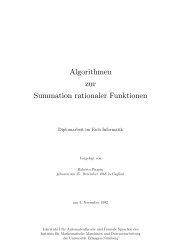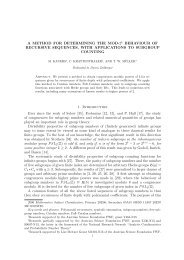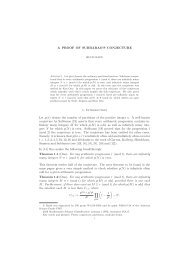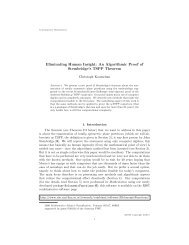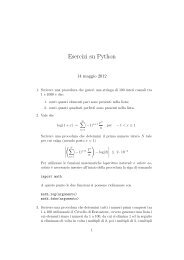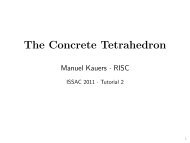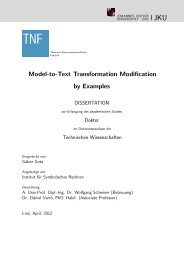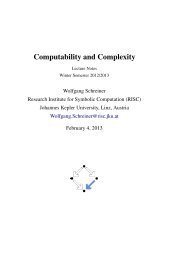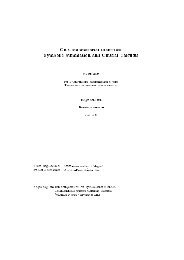Automated Formal Static Analysis and Retrieval of Source Code - JKU
Automated Formal Static Analysis and Retrieval of Source Code - JKU
Automated Formal Static Analysis and Retrieval of Source Code - JKU
Create successful ePaper yourself
Turn your PDF publications into a flip-book with our unique Google optimized e-Paper software.
Chapter 4<br />
Conclusions<br />
In this thesis we presented two approaches for analyzing the source code: formal static analysis<br />
<strong>and</strong> retrieval.<br />
The formal static analysis method <strong>of</strong> source code is based on forward symbolic execution<br />
<strong>and</strong> functional semantics. A prototype environment (FwdVCG) combining these techniques was<br />
implemented which generates the verification conditions necessary for checking the imperative<br />
program correctness. We implemented it in the Theorema system <strong>and</strong> we tested it on programs<br />
written in our mini-programming language.<br />
For checking the validity <strong>of</strong> the verification conditions we built a prototype simplifier that<br />
reduces the verification conditions to (systems <strong>of</strong>) equalities <strong>and</strong> inequalities. The simplified<br />
formulae were obtained using first order logic inference rules, truth constants <strong>and</strong> simple algebraic<br />
simplifications.<br />
As future work we want to apply <strong>and</strong> automate advanced algebraic <strong>and</strong> combinatorial algorithms<br />
<strong>and</strong> methods in order to check their validity. A promising approach seems to be the<br />
Fourier-Motzkin Elimination method ([Sch86]), especially for systems <strong>of</strong> inequalities with small<br />
number <strong>of</strong> constraints <strong>and</strong> variables because <strong>of</strong> the time complexity reasons.<br />
The automated retrieval <strong>of</strong> source code objects was done by extending the functionality <strong>of</strong> the<br />
MES, namely: (i) implementing a custom crawler, <strong>Code</strong>Search category specific, that interacts<br />
with MES services; (ii) integration <strong>of</strong> the <strong>Code</strong>Search data source into the MES infrastructure for<br />
making possible the search within the source code files; (iii) enhancing the user interface with<br />
<strong>Code</strong>Search category specific context actions <strong>and</strong> data-drilling operations.<br />
Some <strong>of</strong> the open functionalities <strong>of</strong> the MCS are: (i) the implementation <strong>of</strong> complex context<br />
actions which require the information stored in the database; (ii) the synchronization <strong>of</strong> the index<br />
with the data obtained from crawling to avoid inconsistencies; (iii) add authentication <strong>and</strong><br />
authorization rules <strong>Code</strong>Search category specific, etc.<br />
We also propose a design solution for the integration <strong>of</strong> FwdVCG into Mindbreeze <strong>Code</strong> Search,<br />
which shows how the formal methods can be used in real s<strong>of</strong>tware programs rather than being used<br />
for verification <strong>of</strong> small programs.<br />
Problem Specification. We are interested in the retrieval <strong>of</strong> the callables artifacts <strong>and</strong> their<br />
specification from the source code files repositories crawled.<br />
Due to the Rats! parser, we are able to retrieve just the Java methods <strong>and</strong> the JML specifica-<br />
53



